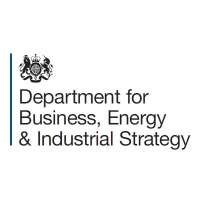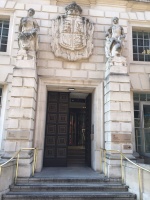Difference between revisions of "Department for Business, Energy and Industrial Strategy"
(→Background) |
|||
| Line 6: | Line 6: | ||
==Background== | ==Background== | ||
| − | The creation of BEIS was one of the first acts of [[Theresa May]]'s premiership following the abolition of DECC. The move caused controversy amongst green campaigners and opposition MPs. <ref> Adam Vaughan, [https://www.theguardian.com/environment/2016/jul/15/decc-abolition-major-setback-for-uk-climate-change-efforts Abolition of Decc 'major setback for UK's climate change efforts'], ''The Guardian'', 15 July 2016, accessed 25 October 2016. </ref> | + | The creation of BEIS was one of the first acts of [[Theresa May]]'s premiership following the abolition of DECC. The move caused controversy amongst green campaigners and opposition MPs who condemned it as a 'major setback for UK's climate change efforts'. <ref> Adam Vaughan, [https://www.theguardian.com/environment/2016/jul/15/decc-abolition-major-setback-for-uk-climate-change-efforts Abolition of Decc 'major setback for UK's climate change efforts'], ''The Guardian'', 15 July 2016, accessed 25 October 2016. </ref> [[Policy Exchange]] conversely argued that the merger of BIS and DECC elevated climate change issues to 'a much higher level politically' <ref> Richard Howard, [https://policyexchange.org.uk/green-groups-should-embrace-not-bemoan-the-merger-of-decc-and-bis/ Green groups should embrace, not bemoan, the merger of DECC and BIS], ''Policy Exchange'', 15 July 2016, accessed 25 October 2016.</ref> |
==People== | ==People== | ||
Revision as of 10:51, 25 October 2016
The Department for Business, Energy and Industrial Strategy (BEIS) was created on 14 July 2016 by the merger of the Department for Business Innovation & Skills (BIS) and Department of Energy and Climate Change (DECC). [1]
The department brings together the responsibilities from BIS and DECC, including 'business, industrial strategy, science, innovation, energy, and climate change'. [2]
Background
The creation of BEIS was one of the first acts of Theresa May's premiership following the abolition of DECC. The move caused controversy amongst green campaigners and opposition MPs who condemned it as a 'major setback for UK's climate change efforts'. [3] Policy Exchange conversely argued that the merger of BIS and DECC elevated climate change issues to 'a much higher level politically' [4]
People
Ministers
- Greg Clark (secretary of state for Business, Energy and Industrial Strategy).
- Nick Hurd (minister of state for Climate Change and Industry).
- Jo Johnson (minister of state for Universities, Science, Research and Innovation).
- Baroness Neville-Rolfe (minister of state for Energy and Intellectual Property).
- Margot James (parliamentary under secretary of state, minister for Small Business, Consumers and Corporate Responsibility).
- Jesse Norman (parliamentary under secretary of state, minister for Industry and Energy).
Civil servants
- Alex Chisholm (permanent secretary).
Contact
- General enquiries 1 Victoria Street, London, SW1H 0ET | Email: enquiries@beis.gov.uk | Telephone: 020 7215 5000
- Whitehall office 3 Whitehall Place, London, SW1A 2AW
- Aberdeen office AB1 Building, Crimon Place, Aberdeen, AB10 1BJ
- Sheffield office 2 St Paul's Place, 125 Norfolk Street, Sheffield, S1 2FJ
Notes
- ↑ Ian Johnston, Climate change department closed by Theresa May in 'plain stupid' and 'deeply worrying' move, The Independent, 14 July 2016, accessed 14 September 2016
- ↑ Department for Business, Energy & Industrial Strategy, GOV.uk, accessed 25 October 2016.
- ↑ Adam Vaughan, Abolition of Decc 'major setback for UK's climate change efforts', The Guardian, 15 July 2016, accessed 25 October 2016.
- ↑ Richard Howard, Green groups should embrace, not bemoan, the merger of DECC and BIS, Policy Exchange, 15 July 2016, accessed 25 October 2016.


